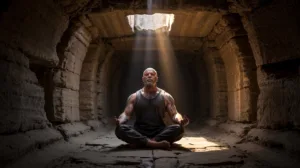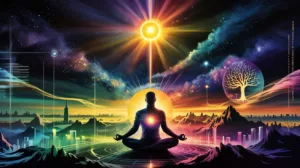Etymology and Meaning:
The term “spiritual awakening” combines “spiritual,” derived from the Latin “spiritus” meaning “breath” or “soul,” and “awakening,” from Old English “awæcnan” meaning “to rise” or “to become active.” Spiritual awakening signifies a profound shift in consciousness, revealing a deeper understanding of existence and connection to the divine.
Who Coined It:
The concept of spiritual awakening isn’t attributed to a single individual but has deep roots in various spiritual traditions. In Buddhism, the term “enlightenment” (bodhi) describes a similar state. Hinduism speaks of “moksha” or liberation. In Western mysticism, figures like Meister Eckhart discussed the soul’s journey towards union with God.
Usage and Influences:
- Old Authors:
- Meister Eckhart: A Christian mystic whose sermons and writings emphasized the soul’s journey towards God, reflecting early concepts of awakening.
- Rumi: A Persian poet and Sufi mystic who explored themes of divine love and spiritual awakening through his poetry.
- Ramana Maharshi: An Indian sage whose teachings on self-inquiry led many towards spiritual awakening.
- Modern Influencers:
- Eckhart Tolle: Author of “The Power of Now” and “A New Earth,” who describes spiritual awakening as a shift in consciousness from ego-based living to present-moment awareness.
- Deepak Chopra: Promotes spiritual awakening through meditation, holistic health, and the integration of Eastern and Western spiritual practices.
- Sadhguru: An Indian yogi who teaches about inner engineering and spiritual awakening through practical tools and wisdom.
Current Usage:
Spiritual awakening is widely used in modern spiritual and self-help communities to describe transformative experiences that lead to greater self-awareness, inner peace, and connection to higher consciousness. It’s a journey of personal growth that often includes meditation, mindfulness, and self-inquiry.
Abuses:
Some exploit the term for commercial purposes, offering superficial “quick fixes” and enlightenment shortcuts. This can undermine the genuine, often challenging, process of spiritual growth and mislead individuals seeking true transformation.
Example of Content:
Summary
Spiritual awakening refers to a profound transformation in consciousness, often marked by increased self-awareness and connection to the divine. Rooted in various traditions, it is widely discussed by mystics and modern spiritual leaders.
Influential Figures:
- Meister Eckhart: His sermons emphasized detachment from the ego and union with God.
- Rumi: Explored divine love and awakening in his poetry.
- Ramana Maharshi: Taught self-inquiry as a path to awakening.
Modern Context:
- Eckhart Tolle: Promotes present-moment awareness as a key to awakening.
- Deepak Chopra: Integrates holistic health with spiritual practices.
- Sadhguru: Offers practical tools for inner transformation.
Stay tuned for more insights and guidance on your journey to spiritual awakening and transformation. Subscribe to our newsletter and follow us on Instagram and YouTube for daily inspiration and updates. Welcome to the Unmatrix Tribe!
Latest Spiritual Awakening posts:
- Why Rock Bottom Is a Portal: Shadow Work, Soul Evolution & the Sacred Descent
 How darkness reveals the divine spark within—and why your breakdown may be your rebirth In the Beginning Was the Word Let there be light. That was the first recorded phrase of creation, echoed through Kabbalah, Genesis, and esoteric mystery schools. But before that divine utterance, there was only the void. This wasn’t chaos—it was potential.… Read more: Why Rock Bottom Is a Portal: Shadow Work, Soul Evolution & the Sacred Descent
How darkness reveals the divine spark within—and why your breakdown may be your rebirth In the Beginning Was the Word Let there be light. That was the first recorded phrase of creation, echoed through Kabbalah, Genesis, and esoteric mystery schools. But before that divine utterance, there was only the void. This wasn’t chaos—it was potential.… Read more: Why Rock Bottom Is a Portal: Shadow Work, Soul Evolution & the Sacred Descent - From External Validation to Inner Illumination: Why the Only Way Out Is In
 In a world run by metrics, likes, algorithms, and dopamine spikes, we have to ask ourselves—what are we really chasing? Recognition? Relevance? A fleeting feeling of being seen? We’ve entered an age where society rewards perception over truth. Where clout has replaced clarity. Where young souls are raised on screens, caught between the pressure of… Read more: From External Validation to Inner Illumination: Why the Only Way Out Is In
In a world run by metrics, likes, algorithms, and dopamine spikes, we have to ask ourselves—what are we really chasing? Recognition? Relevance? A fleeting feeling of being seen? We’ve entered an age where society rewards perception over truth. Where clout has replaced clarity. Where young souls are raised on screens, caught between the pressure of… Read more: From External Validation to Inner Illumination: Why the Only Way Out Is In - The Dark Night of the Soul: Your Gateway to Spiritual Awakening in the Age of Distraction
 In a world that glorifies constant hustle, relentless achievement, and the never-ending rat race, the greatest rebellion you can commit is to pause, isolate, and face yourself. We live in an era where distraction is the currency of control. The more you scroll, binge, and chase external validation, the more you stay trapped in a… Read more: The Dark Night of the Soul: Your Gateway to Spiritual Awakening in the Age of Distraction
In a world that glorifies constant hustle, relentless achievement, and the never-ending rat race, the greatest rebellion you can commit is to pause, isolate, and face yourself. We live in an era where distraction is the currency of control. The more you scroll, binge, and chase external validation, the more you stay trapped in a… Read more: The Dark Night of the Soul: Your Gateway to Spiritual Awakening in the Age of Distraction - The Matrix Exposed: Transhumanism, Freemasonry, and the Quest for Control
 For years, The Matrix has been hailed as a cinematic masterpiece and a metaphor for spiritual awakening. It’s often referenced as a guide to breaking free from the chains of a controlling system and stepping into true freedom. But what if we told you that it’s the exact opposite? What if The Matrix is not… Read more: The Matrix Exposed: Transhumanism, Freemasonry, and the Quest for Control
For years, The Matrix has been hailed as a cinematic masterpiece and a metaphor for spiritual awakening. It’s often referenced as a guide to breaking free from the chains of a controlling system and stepping into true freedom. But what if we told you that it’s the exact opposite? What if The Matrix is not… Read more: The Matrix Exposed: Transhumanism, Freemasonry, and the Quest for Control - True Guides Aren’t Made in Classrooms: They’re Forged in the Fire of Life’s Hardest Lessons
 In a world that glorifies titles, degrees, and certificates, it’s easy to forget that real wisdom doesn’t come with credentials. True guides—the ones who know how to walk beside us through darkness—aren’t born in programs or seminars. They’re formed through the crucible of life itself. Their knowledge is etched into their scars, their resilience born… Read more: True Guides Aren’t Made in Classrooms: They’re Forged in the Fire of Life’s Hardest Lessons
In a world that glorifies titles, degrees, and certificates, it’s easy to forget that real wisdom doesn’t come with credentials. True guides—the ones who know how to walk beside us through darkness—aren’t born in programs or seminars. They’re formed through the crucible of life itself. Their knowledge is etched into their scars, their resilience born… Read more: True Guides Aren’t Made in Classrooms: They’re Forged in the Fire of Life’s Hardest Lessons



